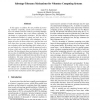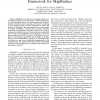6 search results - page 1 / 2 » Sabotage-Tolerance Mechanisms for Volunteer Computing System... |
CCGRID
2001
IEEE
13 years 8 months ago
2001
IEEE
In this paper, we address the new problem of protecting volunteer computing systems from malicious volunteers who submit erroneous results by presenting sabotagetolerance mechanis...
P2P
2008
IEEE
13 years 11 months ago
2008
IEEE
We present a content delivery infrastructure distributing and maintaining software packages in a large organization. Our work based on a trace-based analysis of an existing softwa...
NCA
2008
IEEE
13 years 11 months ago
2008
IEEE
In this work, using a game-theoretic approach, costsensitive mechanisms that lead to reliable Internet-based computing are designed. In particular, we consider Internet-based mast...
ACSAC
2009
IEEE
13 years 11 months ago
2009
IEEE
—MapReduce has become increasingly popular as a powerful parallel data processing model. To deploy MapReduce as a data processing service over open systems such as service orient...
CCS
2010
ACM
13 years 5 months ago
2010
ACM
Tor, a distributed Internet anonymizing system, relies on volunteers who run dedicated relays. Other than altruism, these volunteers have no incentive to run relays, causing a lar...


